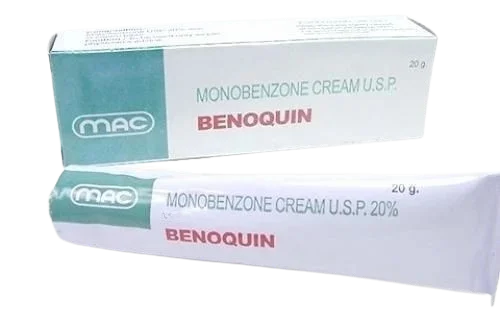Benoquin Cream permanently removes melanin, making it one of the few treatments that fully depigment the skin. It is ideal for vitiligo patients who have lost over 50% of their skin pigment. It destroys melanocytes. Benoquin Cream eliminates melanin-producing cells (melanocytes), leading to uniform skin color in the long run. It contains 20% Monobenzone, which can fully lighten vast areas. Since it removes melanin, skin becomes highly sensitive to the sun. It requires daily sunscreen (SPF 30+) to prevent sunburn & uneven pigmentation.
What is Benoquin Cream?
Benoquin Cream with Monobenzone 20% is a powerful depigmenting agent used to treat vitiligo by permanently removing skin pigment. It destroys melanocytes, the cells responsible for producing melanin, the natural pigment that gives skin its color.
The Science behind Benoquin/Monobenzone
Blocks Melanin Production
Melanocytes produce melanin through an enzyme called tyrosinase. Monobenzone inhibits this enzyme, reducing melanin synthesis and leading to lighter skin. Monobenzone eliminates the pigment with consistent use for a longer, unlike hydroquinone, which only slows melanin production.
Destroys Melanocytes Permanently
What makes Benoquin Cream unique is that it does not just stop melanin production. It kills melanocytes. It leads to irreversible depigmentation. Once treated, the skin can no longer produce pigment in that area. The use is limited to people with widespread vitiligo, where depigmentation occurs naturally.
Gradual Depigmentation with Time
The process of depigmentation happens slowly. Over several months, the pigmented skin matches the vitiligo-affected areas. Complete depigmentation can take 3 to 12 months, depending on individual skin type, response, and how frequently you use the cream.
Increases Sun Sensitivity
Melanin helps protect the skin from UV radiation. Removing melanin makes the skin vulnerable to the sun. People using Benoquin Cream must wear sunscreen (SPF 30+) and avoid excessive sun exposure to prevent sunburn, irritation, or new pigmentation issues.
How Is Benoquin Cream Different from Other Skin-Lightening Agents?
Unlike hydroquinone, which only reduces melanin temporarily, Monobenzone destroys melanocytes, making depigmentation permanent. Compared to kojic acid or arbutin, which provides mild and reversible brightening, Benoquin Cream is much more aggressive and meant only for medical use in vitiligo patients. It is not for general cosmetic skin whitening because the pigment loss is permanent and can lead to uneven skin tone.
How Long Does It Take to Work?
- First visible changes: Within 1-2 months of use.
- Significant depigmentation: Around 3-6 months with regular application.
- Complete depigmentation: Typically 6-12 months, depending on the response of your skin.
Why Is Benoquin Cream Not for General Skin Whitening?
Since Monobenzone permanently removes melanin, doctors prescribe it to vitiligo patients with depigmented skin patches. Using it on normal skin can cause patchy and irreversible whitening. Use it only under medical supervision.
What are the Uses and Benefits of Benoquin Cream?
Uses of Benoquin Cream
Vitiligo Treatment
Used when vitiligo covers over 50% of the body.
Benoquin Cream helps even the skin by removing pigment from unaffected areas to match vitiligo patches.
Permanent Skin Depigmentation
Unlike temporary skin-lightening creams, Benoquin Cream permanently removes melanin by destroying melanocytes (pigment cells). Benoquin Cream makes it the only FDA-approved cream for full-body depigmentation in vitiligo patients.
Medical-Grade Depigmenting Agent
Prescribed to patients with widespread vitiligo who want to depigment their remaining normal skin for an even tone. It is not for general cosmetic whitening.
Benefits of Benoquin Cream
Permanent and Uniform Depigmentation
Works gradually over 3-12 months to even skin color, preventing patchy pigmentation.
FDA-Approved for Vitiligo
Safe and effective when used under medical supervision.
More Effective than Hydroquinone
Hydroquinone and other skin-lightening creams only reduce melanin temporarily, while Benoquin Cream expunges pigment permanently.
Non-Surgical Alternative to Laser Depigmentation
Benoquin Cream provides an alternative to laser depigmentation treatments, which can be expensive and painful.
Boosts Confidence for Vitiligo Patients
Benoquin Cream helps those with extensive vitiligo achieve an even skin tone, reducing the emotional impact of uneven pigmentation.
Important Considerations
- Not for general skin whitening–It can lead to permanent and uneven depigmentation if you misuse it.
- Requires strict sun protection–Since melanin protects against UV damage, daily sunscreen (SPF 30+) is essential to prevent burns and repigmentation.
- Works slowly but effectively–Results take several months but are long-lasting.
What are the Safe Dosages of Benoquin Cream?
Standard Dosage & Application
Apply a thin layer to pigmented skin (not on vitiligo patches).
Use 2-3 times daily, as prescribed by your doctor.
Massage gently until absorbed for the best results.
Continue application until you achieve uniform depigmentation.
Duration of Treatment
- First noticeable lightening: 1-2 months
- Significant depigmentation: 3-6 months
- Complete depigmentation: 6-12 months (varies by skin type)
Once you achieve complete depigmentation, you may not need to continue using the cream, but strict sun protection (SPF 30+) is required for life to prevent repigmentation.
Special Dosage Considerations
If using Benoquin Cream for the first time, apply it once daily for the first week, then increase it to twice daily to prevent irritation. For sensitive skin, start with a lower frequency (once daily), then increase. If you miss a dose, apply it soon, but do not double to catch up.
How to take Benoquin Cream?
Step-by-Step Application Guide
Step 1: Clean the Skin
Wash and dry the area where you will apply the cream.
Avoid applying Benoquin Cream on wet skin for better absorption.
Step 2: Apply a Thin Layer
Take a small quantity of Benoquin Cream and rub softly onto the pigmented skin surrounding the vitiligo patches. Do not apply on vitiligo-affected white patches—only on normally pigmented areas.
Step 3: Massage Until Fully Absorbed
Gently massage Benoquin Cream into the skin until absorbed.
Avoid excessive amounts, as this will not speed up results but may cause irritation.
Step 4: Use 2-3 Times Daily
Apply twice or three times daily, as recommended by your doctor.
Stick to the same routine for consistent results.
Step 5: Sun Protection is a MUST
Since Monobenzone removes melanin, the skin becomes very sensitive to the sun. Apply a broad-spectrum sunscreen (SPF 30+ or higher) before going outside. Avoid direct sun exposure to prevent sunburn or uneven pigmentation.
Step 6: Be Patient–Depigmentation Takes Time
Results may take 3-6 months for noticeable changes.
Complete depigmentation can take 6-12 months or longer.
Continue using until the skin achieves an even tone.
Do’s:
- Use only on vitiligo patients (not for general skin whitening).
- Apply only to normal pigmented skin (not white vitiligo patches).
- Use sunscreen daily to protect from sun damage.
- Follow your doctor’s guidance for best results.
Don’ts:
- Do NOT use on small vitiligo patches–It is for widespread depigmentation.
- Do NOT apply on open wounds or irritated or sunburned skin.
- Do NOT mix with other skin-lightening creams without a doctor’s approval.
- Do NOT stop using suddenly – this can lead to uneven depigmentation.
What to Expect in the Long Run
- First signs of lightening: 1-2 months
- Significant depigmentation: 3-6 months
- Complete depigmentation: 6-12 months
Once you achieve depigmented skin, you may not need to continue using Benoquin Cream, but strict sun protection is necessary for life to prevent repigmentation or sun damage.
When Should I Avoid Benoquin Cream or Use Benoquin Cream Cautiously?
When to AVOID Benoquin Cream
If You Don’t Have Vitiligo
Benoquin Cream is only for vitiligo patients who need full-body depigmentation.
It is not for cosmetic skin whitening—it can cause permanent, patchy depigmentation.
If You Have Localized Vitiligo (Less than 50% Coverage)
If vitiligo affects less than 50% of your body, doctors may not recommend Benoquin Cream. Other treatments (like phototherapy or topical steroids) may be better.
If You Have Sun Sensitivity Disorders
Benoquin Cream removes melanin, making the skin extremely sensitive to UV radiation. If you have a history of sun allergies or skin cancer, avoid using it.
If You Have Open Wounds or Irritated Skin
Avoid using Benoquin Cream on broken, burned, or irritated skin. It can cause severe burning and inflammation.
During Pregnancy & Breastfeeding
Not enough studies confirm safety during pregnancy. Avoid using Benoquin Cream unless prescribed by a doctor.
If You Have Allergies to Monobenzone or Similar Chemicals
Avoid Benoquin Cream you have a known allergy to Monobenzone, hydroquinone, or other skin-lightening agents.
When to Use Benoquin Cream Cautiously
If You Have Sensitive Skin
Start with a small amount once daily before increasing it to twice or three times daily.
If You Have Dry Skin
Benoquin Cream may cause peeling and irritation. Use a moisturizer to prevent excessive dryness.
Frequently Exposed to Sunlight
Always apply sunscreen (SPF 30+ or higher) while using Benoquin Cream.
Wear protective clothing & avoid direct sun exposure.
If you are Using Other Skin Treatments
Combining Benoquin Cream with other skin-lightening agents (hydroquinone, steroids, and retinoids) may cause excessive irritation. Consult your dermatologist before using multiple treatments.
What to Do If You Have These Conditions?
Talk to your doctor before starting Benoquin Cream. Do a patch test on a small area before application. Use sunscreen daily to prevent repigmentation or skin damage. Apply a moisturizer if dryness or peeling occurs.
What are the Side effects of Benoquin Cream?
Common Benoquin Cream Side Effects
- Skin Redness & Irritation–Mild burning, itching, or stinging, especially in the first few weeks.
- Dryness & Peeling–The treated area may become dry or flaky as the depigmentation begins.
- Increased Sun Sensitivity–Since melanin protects against UV rays, the skin becomes more prone to sunburn.
- Uneven Skin Tone–It may cause uneven depigmentation.
Severe Benoquin Cream Side Effects
- Severe Skin Allergic Reactions, including rashes, swelling, severe itching, blisters
- Hypopigmentation Beyond Treated Area–Some patients experience unexpected depigmentation in untreated areas.
- Extreme Sensitivity to Sunlight–If not protected with sunscreen (SPF 30+), the skin may develop burns, irritation, or hyperpigmentation.
- Darkening of Skin in Some Areas–In rare cases, certain areas of the skin may react by becoming darker instead of lighter.




